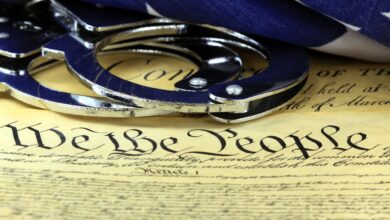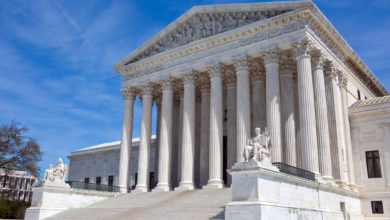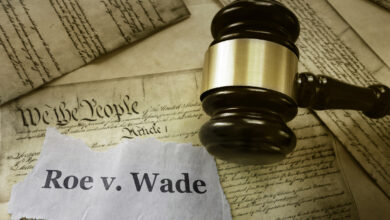Human Nature and Better Angels

If you’re not sure whether you’re a liberal, a leftist, a conservative, or a reactionary, help is on the way.
In a recent essay at New York Magazine, “The Limits of My Conservatism,” Andrew Sullivan proposes an ideological test based on how you answer two questions about immigration:
“On immigration, for example, has the demographic transformation of the U.S. been too swift, too revolutionary, and too indifferent to human nature and history? Or is it simply a new, if challenging, turn in a long, American story of waves of immigrants creating a country that’s an ever-changing kaleidoscope? If you answer “yes” to the first, you’re a reactionary. If “yes” to the second, you’re a liberal. If you say yes to both, you’re a conservative. If you say it’s outrageous and racist even to consider these questions, you’re a card-carrying member of the left.”
Sullivan posits that tribalism and “natural differences between men and women” are forever written into our DNA: “The left is correct that Americans are racist and sexist; but so are all humans.”
The real divide, according to Sullivan, lies in how strongly one wants government to push back against these “permanent and natural limits” to transformational change:
“It seems to me that you can push against these basic features of human nature, you can do all you can to counter the human preference for an in-group over an out-group, you can create a structure where women can have fully equal opportunities — but you will never eradicate these deeper realities.”
Therein lies the rub. Because these “deeper realities” can only be ameliorated, but never eradicated, the argument goes, the left’s top-down attempts to eradicate or stigmatize them are partially responsible for a reactionary backlash from the right:
“[I]f you decide to change the ethnic composition of an entire country in just a few decades, you will get a backlash from the previous majority ethnicity; and if you insist that there are no differences between men and women, you are going to generate male and female resistance. That kind of left-radicalism will generate an equal and opposite kind of right-reactionism. And that’s especially true if you define the resisters as bigots and deplorables, and refuse to ever see that they might have a smidgen of a point.”
There are some obvious flaws in this argument. For instance, it is highly misleading to describe liberals, or even leftists, as attempting to eradicate built-in elements of human nature. And it is equally misleading to characterize the leftist agenda as arising out of a decision to change the ethnic composition of the entire country.
Yet, at the same time, it is undoubtedly true that while demographic change may not be the motivating goal of liberal immigration policies, it will necessarily be one of the results. To many, a welcome result. But not to all.
Some of those who do not welcome demographic change are bigots, to be sure. It is impossible to estimate the percentage of Trump’s base that is made up of hardcore bigots, white nationalists, white supremacists, and anti-Semites. But Charlottesville and racist chants at Trump rallies are indicators that it is at least a sizable minority.
Whether Trump himself should count as one of them is perhaps in the eye of the beholder. Regardless, given the already-narrow makeup of his base, what’s more important is that Trump can’t afford to lose their support.
At the same time, as Sullivan observes, “many others who are resistant to drastic change are just uncomfortable, or nostalgic, or afraid, or lost.” They feel that their way of life is being disrespected and threatened, and they are therefore vulnerable to the siren song of right-reactionism.
Sullivan’s way out of this dilemma is, predictably, what he calls conservatism. By conservatism, Sullivan means a viewpoint that recognizes that although it has been “too swift, too revolutionary, and too indifferent to human nature and history,” the demographic transformation of the United States is “simply a new, if challenging, turn in a long, American story of waves of immigrants creating a country that’s an ever-changing kaleidoscope.”
But what Sullivan describes as conservatism could just as easily be described as liberalism, or just another side of human nature. Holding two competing thoughts at the same time is not exclusively, or even primarily, a conservative virtue. Conservatives don’t oppose all change. And liberals don’t deny that built-in characteristics of human nature place limits on transformational change. Even Bernie Sanders recognizes that sometimes it’s necessary to avoid trying to bring about too much change too fast. Witness the four-year transition period built into his Medicare For All proposal.
Still, the clash between the forces of change and what Sullivan calls the “permanent and natural limits” to transformational change permeates our political discourse.
Perhaps the most telling example is the divide between what conservatives understandably believe is a matter of “religious freedom” and what liberals understandably believe is discriminatory in practice. Conservatives will be quick to tell you that they abhor discrimination, and liberals will be just as quick to say that they cherish religious freedom. Both mean what they say.
But what happens when a devout Christian baker crosses the path of a gay couple looking for a wedding cake? Built-in human resistance to cultural change collides with forces seeking to push back against it.”
Setting boundaries around tribalism when it runs up against other values isn’t the same thing as denying its existence or trying to eradicate it. Nobody outside of the fringes seeks to eradicate religious freedom, which along with differences in race and gender defines much of our tribal identity.
Rather, the struggle is over where to draw the line when immutable tribal realities like religion, gender, and race butt up against civilizing checks on those realities like anti-discrimination laws.
There’s nothing new about this clash. It’s the story of civilization itself. It’s the story of groups of human beings setting behavioral, cultural, social and religious boundaries “to hold back the tides of human nature and to negotiate the consequences of human nature when it runs amok,” leading to conflict, violence and war.
Freud wrote that self-preservation and aggression are built into “the deepest essence of human nature.” Civilized society, according to Freud, “demands good conduct and does not trouble itself about the instinctual basis of this conduct.” Its members “are constantly subject to an unceasing suppression of instinct.”
The philosopher Thomas Hobbes warned that the “natural condition of mankind” unrestrained by government and civilization would promise only a “nasty, brutish and short” life in a state of nature.
And Abraham Lincoln’s appeal to “the better angels of our nature” carries the implicit recognition, painfully clear at the time of his first inaugural address in 1861, that there are darker angels within us that need to be overcome.
While some may view an appeal to our better angels as disrespecting or threatening their way of life, I still can’t help but believe that it’s the right side to be on.




